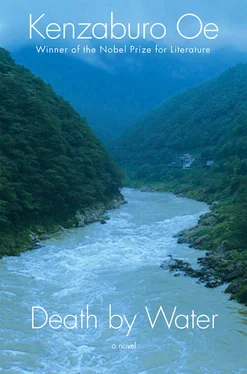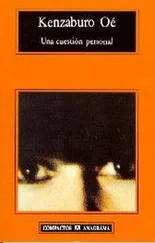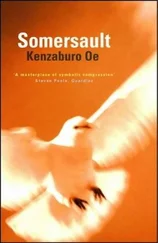“As for our mother, when she wrote those lines she was still seeing you as Kogii, and she was concerned that you weren’t doing anything to prepare to send Akari up into the forest, since there’s a good chance he won’t live as long as you do. But I think part of your reason for wanting to come back down here for a while is a way of taking the first step toward making the necessary preparations to send Akari (and, eventually, yourself) up into the forest — with every bit of metaphorical subtext the phrase carries in local lore.”
After her long monologue, Asa drove in silence for several miles, and then stopped on the side of the road. “Just walk up this path — it’s really more like a trail for wild animals — and you’ll end up at the Forest House. You haven’t forgotten the shortcut, have you? We’re running late today, so I’m going to let you off here and go straight home. After I’ve had a little rest I’ll come back with some dinner for you. I’ll drop off your luggage then, too.
“Oh, and about Unaiko, the young woman you met in Tokyo? She’ll be dropping by the Forest House tomorrow with Masao Anai, who as I mentioned is the leader of the theater group. (You probably know he was a pupil of Goro Hanawa’s, although ‘disciple’ might be a better word.) Unaiko said that while you’re staying there they would like to talk to you about a number of things — I gather she just hinted at this when you spoke in Tokyo. Tomorrow some of the troupe’s younger members will be stopping by to install the commemorative stone, and after that’s done Masao and Unaiko are hoping to talk to you about your forthcoming collaboration. They’re really looking forward to this, so please be on your best behavior!”
2
Early the next morning Asa, who was always very well organized, dispatched a couple of the younger members of the theater group to pick up the stone. The back garden was planted with flowering dogwood and a maple tree of the variety known as Big Sake Cup, which Chikashi had brought from her garden in Tokyo along with a pomegranate tree she’d been given by her mother-in-law (that is, my mother), and these had grown in a way that was beautifully proportional with the intimate scale of the garden. I agreed with Asa that installing the big stone in front of the trees, facing the house, was a perfect plan.
The members of the Caveman Group arrived in a minivan with the name of their theater troupe emblazoned on the side. (Goro Hanawa had evidently written it out for them, and his calligraphy had been professionally enlarged and painted on their car.) As we stood in the front garden — which had simply been carved out of the overhanging rock and spread with gravel — Asa, who had hitched a ride with the group, introduced me to Masao Anai. I remembered having seen him before; he was a man in his forties, very simply dressed, with the look of someone who had been immersed in the theater world for a long time. Next to him, standing up very straight, wearing casual work clothes and a big smile, was the young woman I had met in Tokyo. Asa knew all about our stranger-than-fiction encounter, but she didn’t mention it. She simply said, “I’d like you to meet Masao Anai and Unaiko.”
After we had exchanged hurried greetings, Masao Anai sent the two apprentices to fetch the poetry stone, wrapped in an old blanket and tied with rope, from the back of the van. Then he led his young helpers to the back garden with their heavy burden, which they carried by balancing it on two sturdy wooden pallets.
Unaiko had remained behind, and as I was thanking her again for coming to my rescue the other day in Tokyo, Asa interrupted. “You know, Chikashi had something to do with Unaiko’s adopted name,” she announced.
Unaiko nodded. “They say the person who first started calling the leader of our troupe ‘the caveman’ was Goro Hanawa,” she said. “And I heard from Asa that your mother once said that her granddaughter, Maki, looked like a child from medieval times — an unaiko —with her unusual unai -style hairdo. (I gather it was a bob with bangs and a little ponytail sprouting on top.) And there I was, wearing my hair in a similar style. So I said, half joking, ‘Well, maybe I should change my name to Unaiko!’ And the younger folks thought it was a great idea, so the name sort of stuck. It was just a bonus that unai echoes our leader’s surname, Anai.”
“I remember hearing that the first time Chikashi brought our children to this valley to meet my mother, our older daughter, Maki, was wearing her hair rather like Unaiko here (though Maki’s version was a bit more girlish), and my mother thought it looked wonderful,” I said.
“Actually, I was standing right there when Chikashi and Mother were having that conversation,” Asa said. “Mother also mentioned an ancient ninth-century song that includes the term unaiko, and she even sang a few lines for us! It was lovely — all about summer rain and the cuckoo’s song and children running around wearing this same kind of retro-medieval hairstyle. Mother seemed very happy as she was singing those words, but of course she was already in high spirits because her grandchildren had come to visit.”
Masao Anai had returned from the garden, so Asa took a minute to fill him in on what he had missed before continuing her story.
“Anyhow,” she went on, “for the duration of their visit, everyone was calling little Maki ‘Unaiko.’ Years later, I told the story to this Unaiko, and the rest is history. Well then,” she added briskly, “shall we take a peek at how the young people are getting along in the garden?”
But by the time we went into the dining room and peered out at the back garden through the big plate-glass window, the giant stone was already in place and the young workers, who were taking a short break, seemed to be anxiously gauging our reaction. I assured Asa that the placement was flawless, and she flashed an “A-OK” sign. As the young men headed around to the front of the house, she went out to meet them. The rest of us sat gazing at the garden, with everyone’s eyes seemingly focused on the poetic inscription carved into the stone.
“Asa explained the significance of ‘the river current,’” Masao Anai said. Seeing his face in profile I could understand why Goro, who was always an extraordinarily perspicacious bestower of pet names and sobriquets, had dubbed him “the caveman.” While it had obviously started out as a clever play on the first element of Anai’s surname (in Japanese, ana can mean “cave,” “hole,” or “cavern”), the nickname was also a reaction to his distinctive physiognomy — especially the way his forehead sloped back from the sharply protuberant ridge of bone above his eyes, giving him an air of wild, primordial ruggedness. That sort of multilayered resonance was typical of Goro’s humor, and evidently “the caveman” had also struck Masao as a good name for his troupe.
“Actually,” Masao went on, “I’ve been thinking a lot about the dramatic significance of the way the notional alter ego, Kogii, runs through your novels as a sort of supernatural leitmotif. Reading this poem, I can’t help thinking that the idea of being sent up into the forest without making preparations seems like a contradiction of the rules of the mythical world you so often evoke in your work. I mean, his childhood playmate, Kogii, was someone who originally came down from the forest and later flew back up into the woods on his own.”
“You’re exactly right,” I said. “But when this poem mentions Kogii, it’s mainly talking about my earliest nickname. My mother uses the childhood name as a sort of verbal spear to ambush my adult self with a serious question about the preparations I’ve made for my own demise and for that of my son, Akari. So the meaning of her section of this poem is, essentially, that the most important thing I need to do in order to prepare for my own death is to get Akari ready for his trip to the forest, which may well precede mine.”
Читать дальше










